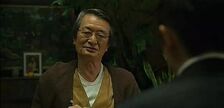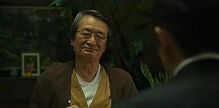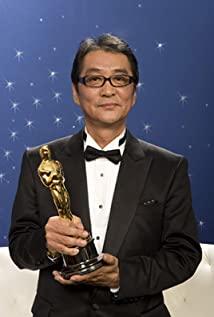On October 29, 2021, the 4K-restored "The Undertaker" landed in mainland China theaters. Many people call it a "rescreening" which is not accurate. This is really 13 years late for the theater premiere. The earliest screening of the film in the mainland was at the 17th Golden Rooster and Hundred Flowers Film Festival held in Dalian in September 2008. At that time, its Chinese translation was "The One Who Sends Off the Dead", and the film won the "Audience Favorite Foreign Feature Film" "," the audience's favorite foreign director", "the audience's favorite foreign actor" three awards, although according to some netizens recalled that very few people watched the film at that time.
Now that we watch this film, we may not be able to taste the atmosphere of the times. At the beginning of the film, the male protagonist who served in the symphony orchestra was disbanded by the band, and he was in huge debt because of the loan to buy the piano. In the context of the global financial crisis, in the eyes of the audience at the time, "The Undertaker" may not convey a philosophy of life and death, but is closer to an inspirational story of finding a second spring after unemployment.
Occupation that is discriminated against
The conception of "The Undertaker" began when Masahiro Benmu traveled to India when he was 27 years old. He was very touched by the local funeral ceremony. After returning to China, after reading the book "The Diary of a Coffin Husband", he first came into contact with this special profession and came up with the idea of making it into a movie. Death is obviously something that is closely related to everyone, but it is so taboo by the public; the undertaker is clearly engaged in very important work, but is discriminated against because of the prejudice in the world. Takita Yojiro, who was born in pink films, took over the guide tube for this film. Perhaps somewhere in his heart, the two professions of mortuary and pink film director overlap somewhat.
Yojiro Takita made his directorial debut in 1981's "Crazy Female Teacher", and later filmed the "Crazy Train" series, becoming a well-known director in the "industry". Although it is an unpopular business in the eyes of the public, it allows him to fully explore and experiment, and develop his own diverse styles of comedy and drama. He said, "For something like a pink movie, as long as the pink part is taken out, the rest can be played freely, which is very interesting."
These clips with pink genes can also be seen in "The Undertaker", sometimes humorous about the body - for example, at the beginning of the film, the male protagonist played by Masahiro Motomu moves his hands under the cover, wiping the body of the deceased, touching the When he got down, he suddenly froze, his eyes turned awkwardly, and he whispered to his boss, "There is that"; or when he was driven by ducks to be a model for a teaching video, the scene where the male protagonist only appeared in adult diapers, instantly made people feel Reminiscent of an adult film set. Sometimes it is a burst of lust - the hero who has dealt with the carrion returns home, and suddenly hugs his wife and greedily asks for the warmth of her flesh. The only missing minute of the Chinese theatrical release is here. Perhaps the censors were keen to see that the director used the pink movie technique to shoot Ryoko Hirosue's panties.
Except for these occasional episodes, most of the time, the funeral ceremonies shown in the film are solemn and decent. The director shows meticulously how the mortuary prepares the deceased to depart by magic tricks - cleaning the mouth, scraping the face , changing clothes, wiping the body, loosening the post-mortem stiffness, putting on makeup, and finally being sent to the coffin. The family members seemed to be the audience of the performance, briefly forgetting the sadness in the surprise of their techniques. The film repeatedly emphasizes the artistic side of the mortuary profession, such as setting the male protagonist as a cellist, or alternately showing the male protagonist playing the cello and the burial ceremony in the form of montage (supplemented by Hisaishi Rang to the sensational. Excessive music), and even at the end of the credits, a fixed shot showing the panorama is used to reproduce the complete process of the funeral in every detail, so as to arouse the audience's respect for the profession of the funeral director.
beauty and falsehood
In order to reflect the "beauty" of the burial, correspondingly, those "unbeautiful" parts were expelled from the camera - the rotting corpse was not directly represented, the remains of the deceased were always clean and peaceful, and the grief of the bereaved family was also shown very restraint . It can be said that there is no real cruel death in the film, there are only artistically processed and idealized deaths.
Itami Shisan also filmed funerals ("Funeral", 1984), but the funerals he photographed were far more perfunctory and embarrassing. Children who have not yet developed a reverence for death fight each other, the master and his mistress are secretly secreting clouds and rain in the woods, and the monk who recites the scriptures makes a small calculation to make a little more profit. The most amazing thing is that the camera sweeps the feet of the kneeling family members from behind. They turn their toes, move the soles of their feet, and let the numb feet take a breath while others are not paying attention. Then the camera moves up and looks straight, The crowd was still mourning. Perhaps it was Zhuyu in the first place, and "The Undertaker" deliberately avoided the teasing and irony of the ceremony, and this seriousness made the sensationalism somewhat stereotyped in the second half of the film.
Similar to its representation of death, there is never any real conflict in The Undertaker. The wife played by Ryoko Hirosue is a perfect wife with an inner void. Her husband first hid a huge debt from her, and then hid a new job, but she followed her husband to live in the country without any regrets, with the gentleness of Yamato Nadeko. Compassionately forgiving her husband again and again, even if the male protagonist never made any active recovery after his wife ran away in frustration. Watching the wife's professional approach to her husband's burial at the funeral of an acquaintance, gradually showing an expression of admiration and pride, the audience was shocked that the so-called conflict between husband and wife was actually only the wife's reformation. No wonder she was spoiled. The male protagonist always has a child-like innocent expression on his face.
And at the end, the bridge between father and son reconciles, which simply pushes this idealized reconciliation to its peak. The male protagonist received the news of the death of his father who had abandoned him for more than 30 years. At first, he was unwilling to take responsibility for his burial, but finally changed his mind under the persuasion of his wife and colleagues. The climax of the play occurred when the male protagonist was buried for his father and found that his father was holding a stone in his hand - a symbol that the father still missed the male protagonist at the last moment of his life. However, after going through the whole film several times about the foreshadowing of the stone, perhaps only the male protagonist is left in shock at this time. According to the drama routine, the stone is undoubtedly the last clue to be recovered. The stone on the screen and the stone in the audience's heart landed at the same time, and the story ushered in the end without any accident.
The status of death is supreme, so there is a saying that "the dead are the greatest". Under this powerful moral pressure, the male protagonist had to reconcile with his father who had cut off the relationship. The stone appeared in the father's hand just right, making the reconciliation seem blameless. In fact, if the director really wants to shock the audience, leaving his father's hands empty may be able to tell some truth. As Žižek said, movies and TV dramas always like to shoot on the plane that is about to crash. The protagonist calls his family and says, "I will always love you", but the real action in the face of death may be to call and tell the other person. Half: "I never loved you."
Shocking Oscar
Year 2008. At the 81st Academy Awards, the best foreign language film was an upset. At that time, the media were generally optimistic about "Between the Walls" by French director Lauren Gontay and "Waltz with Bashir" by Israeli director Ali Foreman. When the host read out the shortlisted films, the voice of the two films was the highest.
According to the usual operation of the awards ceremony, the crew of popular movies will set up cameras to catch the instant expressions of the winners. It was the same on that day. When the award-winning film was announced, Masahiro Benmu saw the camera from a distance pushing the crew of "Waltzing with Bashir" in close-up, so that "Departure" came from his ears, which sounded so strange. reality. This is the first time that a Japanese film has won this honor since the best foreign language film became a permanent Oscar. Because it was too upset, the camera at the venue did not capture what was on the faces of the creative team when this historic moment happened. expression.
I can't figure out why so many people have won awards for "The Undertaker", including the director himself. After winning the Best Foreign Language Film award, director Yojiro Takita said in an interview with reporters, "Even our crew would like to ask the judges of the Academy Awards 'why'?"
Yojiro Takita himself speculated, "Most of the other shortlisted works are related to social and political issues. "The Undertaker" depicts universal and at the same time private emotions. The award for "The Undertaker" may reflect the Americans think, 'Enough is enough conflict!'"
This is as if the domineering president is used to seeing the "coquettish bitches" around him, and when he sees the disgraced young girl, his heart suddenly moves, "You have successfully attracted my attention!" , In our inner village, are there dozens of people like me?
The biggest controversy surrounding "The Undertaker" has never been whether it is good or not, but whether it is "so" good enough to win the Oscar for best foreign language film, and good enough to represent all Japanese films on the world stage Enjoy the glory. Ichikawa Kun, Kinoshita Keisuke, Kobayashi Masaki, Emissary Kawara Hiroshi... In a place where so many great masters have returned, it is Takita Yojiro, a not-so-famous director who has been favored.
Back then, Yojiro Takita stood on the Oscar podium and said, "We will be back." But thirteen years later, he couldn't go back, and neither did Japanese movies.
Although it was full of controversy when it won the award, looking back on it, it is amazing that the award-winning "The Undertaker" is indeed a film that combines the characteristics of Japanese films. It may not be the best, but it is indeed the most representative of Japanese cinema, with its strengths and weaknesses, aesthetics and clichés.
View more about Departures reviews









